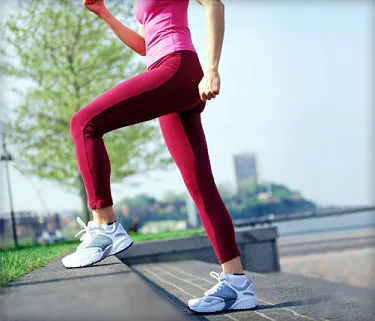By Barbara Russi Sarnataro
If someone told you right now what the absolute best exercise to lose weight was, would you do it? You might when you read this. Drum roll, please!
The best exercise to lose weight is: "the exercise you'll do," says Timothy Church, MD, MPH, PhD, a professor at Pennington Biomedical Research Center in Baton Rouge, La.

Other experts interviewed by WebMD said much the same thing about weight loss workouts.
"The two things that stop people from losing weight with exercise are either boredom or injury," says physical therapist and strength and conditioning specialist Ben Quist, PhD, NSCA.
The truth is that weight loss is about creating a calorie deficit -- in other words, burning more calories than you take in. So, they say, whilerunning at an 8-minute-mile pace might be a great calorie burner, if you're not going to do it, it's not going to help you. Instead, start with something you can do, like walking or working out on an elliptical machine or exercise bike.
The Beef on Strength Training
In all cases, however, you'll burn more calories with cardio (aerobic) exercise than with strength or resistance training.
"Strength training itself will not lead to an appreciable amount of weight loss because it just doesn't burn enough calories," says Glenn Gaesser, PhD, FACSM, kinesiology professor and department head at the University of Virginia in Charlottesville.
But what about all that talk that more muscle mass equates to more calories burned, even when you're at rest?
"It's a myth. It's not going to happen," says Gaesser.
The only successful studies to show a significant calorie burn following a weight-lifting workout (afterburn) were done with serious lifters, working out for 60 to 90 minutes at a time and lifting as much as they could on every set.
In fact, Gaesser says, at best, gaining one pound of muscle will help you burn 5 to 10 extra calories a day. You could do that chewing gum.
That's not to say that strength training isn't important for the overall health of the body. But when it comes to burning the most calories, go for cardiovascular exercise. And vary the intensity, says Quist.
"Do aerobic base-building workouts," he says, where you alternate between moderate and higher intensity, either within the same workout or on alternate days.
Quist also recommends cross-training -- that is, doing a range of different activities during your workouts. Not only does this help you keep from getting bored, it's better for your body. Doing different activities recruits different muscle groups. You're also less likely to develop an injury, says Quist, since doing the same thing day after day creates wear patterns on your joints.
Get creative, says Gaesser, whose graduate students teach an entire class on novel ways to burn calories. For example, he says, if you're a golfer, ditch the cart and walk with your clubs. You'll do what you love -- and burn more calories.
Exercise Is Just One Piece of the Puzzle
Keep in mind that exercise is just one portion of a successful weight loss program, say experts.
"Eating and exercise are not separate issues," says Church. "They're intimately connected. Too many people think these large doses of exercise are an excuse to eat whatever you want."
Unfortunately, today food is everywhere. There are candy bars at Home Depot and cheesecakes at Barnes & Noble. Gaesser says his kids can't believe a gas station used to be just a place to get gas. And portions are out of control, says Church -- just look at the size of the plates at restaurants.
"It's so much easier not to eat calories than to burn them off," says Quist.
And keep in mind that the definition of successful weight loss is keepingthe weight off.
"It's not hard to lose weight," says Church. "Anyone can lose weight. What's hard is keeping it off. Those that combine both diet and exercise keep it off."
But what about metabolism? Many people who have struggled to lose weight believe they have unusually slow metabolisms.
Chances are, "you don't have a slow metabolism," says Church. "It is so rare that of all the metabolisms we've checked (and he does this daily), I can't remember one being legitimately slow."
The truth is, he says, "bigger people have a higher metabolism because they're bigger. Metabolism is how much mass you have. The more mass you have, the more energy you burn just sitting around."

No comments:
Post a Comment